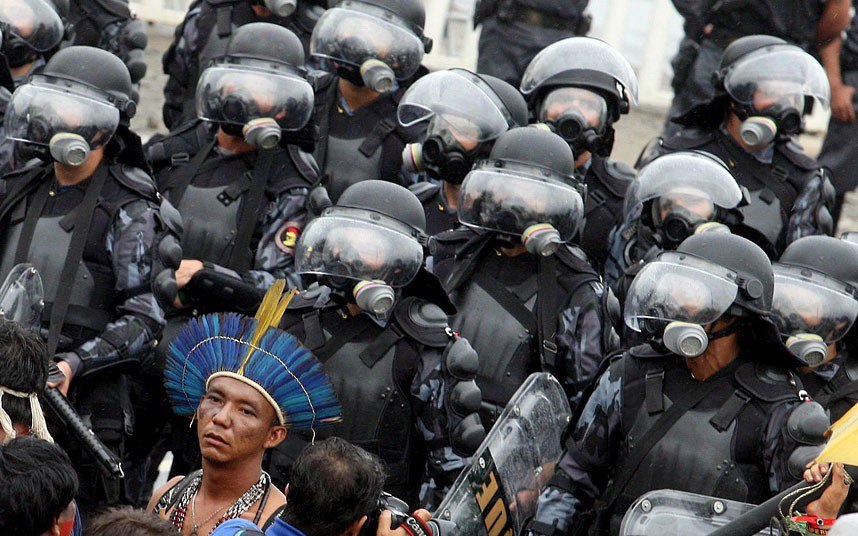Rise in authoritarian values coupled with intensifying natural resource exploitation crippling civil society
Johannesburg / London, 3 December 2016:
The scramble for natural resources coupled with the rise of authoritarian values around the world endangers activists and prevents them from playing their rightful role in the management of natural resources, says a new report from CIVICUS and Publish What You Pay.
Against All Odds: The Perils of Fighting for Natural Resource Justice documents the ways in which governments and business in virtually all resource-rich countries restrict civil society, and how this actively undermines efforts to achieve greater transparency and accountability in the extractives sector.
Those who speak out over unsustainable and unscrupulous natural resource governance suffer a range of attacks – from smear campaigns to murders that go uninvestigated.
“In the face of closing civic space, activists end up spending more time protecting themselves and their organisations,” said Elisa Peter, Executive Director of Publish What You Pay. “This prevents them from carrying out their vital work: scrutinizing the environmental and economic impact of extractive industries, ensuring that the voices of affected communities are heard, and blowing the whistle on corruption.”
Based on first-hand exchanges with those on the front lines of natural resources activism, Against All Odds documents two types of repression: use of the law as a tool against activism and use of extra-legal tactics against activism.
Regarding the use of the law, the report records regulations that seek to control civil society in Australia, Canada, Equatorial Guinea, Bolivia, Russia, Kyrgyzstan, Kazakhstan, Ethiopia, Kenya, Uganda and Azerbaijan. Tightening controls on public space are documented in Colombia, Guatemala, Brazil, Australia, the United Kingdom, Niger, Kazakhstan and Chile, and criminalisation of activists is recorded in Peru, Panama, El Salvador, Cameroon, Sierra Leone, Cambodia and Azerbaijan.
Regarding extra-legal tactics, the report documents intimidation and violence in Colombia, DRC, Indonesia, Honduras, Philippines, Brazil and South Africa, the public vilification of those who speak out in Congo-Brazzaville, Ecuador, Argentina, Canada and the USA, and unwarranted surveillance in India, Nicaragua and Canada.
The replication of repressive policies and practices from state to state suggests that nations are quickly learning from one another the most effective methods to stifle independent civil society.
Whether intrinsically opposed to natural resource exploitation, or rather concerned with a fair distribution of its costs and benefits, activists seem just as likely to be harassed or even killed, the report finds. As layers of discrimination overlap, indigenous women activists appear to be the most at risk. Civil society is developing its own self-protection mechanisms in response to attacks, collected in the report.
“It is a tragedy that those trying to protect natural resources are themselves in need of protection from corporate greed and political collusion,” said Dr Dhananjayan Sriskandarajah, Secretary-General of CIVICUS. “From Australia to Uganda, courageous activists have refused to play the victim. It is imperative that international civil society stands in solidarity with those on the frontlines of the struggle for natural resource justice.”
CIVICUS and PWYP call on governments to repeal restrictive legislation and live up to their commitments to protect and enable civil society under international and national law.
Companies and governments must foster strong civil society engagement in natural resource governance, through the Extractive Industries Transparency Initiative (EITI) and the Open Government Partnership (OGP) among others. This includes refraining from vilifying environmental activists. Companies and investors must obtain free, prior and informed consent from communities affected by their projects.
CIVICUS and PWYP also strongly encourage civil society actors to work in unison towards a better protection of colleagues on the ground. This can be achieved through better documentation of cases of repression and by holding to account those in charge of a country’s natural resources.
Notes to editors:
Against All Odds: The Perils of Fighting for Natural Resource Justice can be accessed online here: https://www.pwyp.org/pwyp-resources/against-all-odds/
The report will be presented 3 December at an event organised by CIVICUS and Publish What You Pay at Transparency International’s International Anti-Corruption Conference in Panama.
PWYP’s Executive Director will also join a panel on civic space at the OGP Summit 2016 in Paris to share the key findings of the report.
CIVICUS is an international alliance dedicated to strengthening citizen action and civil society throughout the world.
Publish What You Pay is a global network of civil society organisations united in their call for an open and accountable extractive sector so that oil, gas and mining revenues improve the lives of women, men and youth in resource-rich countries.
Press contacts:











